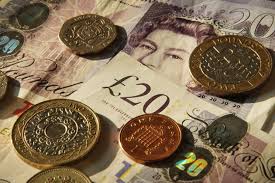
The Organization for Economic Cooperation and Development (OECD) says that Britain's economic performance is being depressed by concerns about the ultimate result of the composition of Brexit.
The British economy would grow by 1.4 percent this year, estimated the OECD in its Economic Outlook report on Wednesday. The report described that number as being "modest".
Growth in 2019 is forecast at 1.3 percent of GDP.
A number of consecutive years of strong growth is reflective of the fact that the British economy is doing well and there is little slack. This is further supported by forecast of unemployment remaining below the 5 per cent mark and a further reporting of a an almost near record numbers of jobs. The rate of unemployment is at its lowest ever since the mid 1970s.
However, the report noted that the OECD peers have outperformed the British economy where a 2.9 per cent growth has bene forecast for the United States in the current year and a 2.2 per cent growth for the eurozone for the same period.
"The British economy has deteriorated since mid 2017. While most of the other OECD economies have picked up," Annabelle Mourougane, senior economist at the OECD, told the media.
The report also identified a number of factors that has resulted in the difference between the eurozone and U.S. economies with the British economy.
"The first is political uncertainty which is holding back investment, and most of that is related to uncertainties around the Brexit negotiations, there is no clear view of what is going to happen," said Mourougane.
"Second, there has been a major depreciation in sterling since the Brexit referendum in June 2016 and the effect on inflation has to increase it quite substantially."
Before the Brexit referendum, the consumer price index (CPI) inflation was 0.5 percent. However, there was a 20 per cent drop in the value of sterling in response to the Britishers going to a vote to leave the European Union (EU).
In November last year, inflation was quickly sent to a rate of 3.1 per cent because of the depreciation in the sterling. However, since then, there has been some cooling in the inflation which was at 2.2 percent in April which is the latest figure available.
"Inflation has come down recently but has been high and has eroded household incomes," said Mourougane.
There was just a 0.1 per cent growth quarter on quarter in the British economy in the first quarter.
Mourougane said: "The first half of the year was very weak, with an additional effect from bad weather which has clearly contributed, but it is difficult to quantify. I would say it was part of the decline in recent economic performance."
(Source:www.xinhuanet.com)
The British economy would grow by 1.4 percent this year, estimated the OECD in its Economic Outlook report on Wednesday. The report described that number as being "modest".
Growth in 2019 is forecast at 1.3 percent of GDP.
A number of consecutive years of strong growth is reflective of the fact that the British economy is doing well and there is little slack. This is further supported by forecast of unemployment remaining below the 5 per cent mark and a further reporting of a an almost near record numbers of jobs. The rate of unemployment is at its lowest ever since the mid 1970s.
However, the report noted that the OECD peers have outperformed the British economy where a 2.9 per cent growth has bene forecast for the United States in the current year and a 2.2 per cent growth for the eurozone for the same period.
"The British economy has deteriorated since mid 2017. While most of the other OECD economies have picked up," Annabelle Mourougane, senior economist at the OECD, told the media.
The report also identified a number of factors that has resulted in the difference between the eurozone and U.S. economies with the British economy.
"The first is political uncertainty which is holding back investment, and most of that is related to uncertainties around the Brexit negotiations, there is no clear view of what is going to happen," said Mourougane.
"Second, there has been a major depreciation in sterling since the Brexit referendum in June 2016 and the effect on inflation has to increase it quite substantially."
Before the Brexit referendum, the consumer price index (CPI) inflation was 0.5 percent. However, there was a 20 per cent drop in the value of sterling in response to the Britishers going to a vote to leave the European Union (EU).
In November last year, inflation was quickly sent to a rate of 3.1 per cent because of the depreciation in the sterling. However, since then, there has been some cooling in the inflation which was at 2.2 percent in April which is the latest figure available.
"Inflation has come down recently but has been high and has eroded household incomes," said Mourougane.
There was just a 0.1 per cent growth quarter on quarter in the British economy in the first quarter.
Mourougane said: "The first half of the year was very weak, with an additional effect from bad weather which has clearly contributed, but it is difficult to quantify. I would say it was part of the decline in recent economic performance."
(Source:www.xinhuanet.com)














